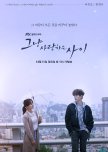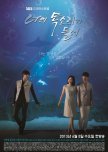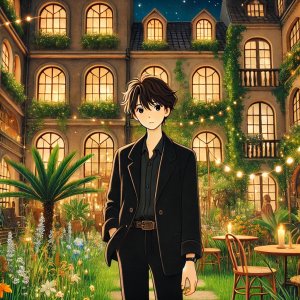
Death, Romance, and a Whole Lot of Cotton Candy
There’s something incredibly frustrating about a drama that almost works. Kokdu: Season of Deity is one of those shows that flirts with being something bold — a quirky fusion of myth, romance, and moral reckoning — but it never quite commits to anything long enough to hit you where it counts. It's like getting charmed by a magician who forgets the second half of every trick.The setup is promising: a grim reaper cursed to roam the human world, doling out judgment and — bafflingly — also trying to fulfill romantic duties. There's a whiff of Goblin-meets-Dali & Cocky Prince energy here, the kind of supernatural rom-com blend that could have been weird and wonderful. But instead of digging into the weight of its mythos or fully embracing its absurdity, it kind of wobbles in between, unsure of what it wants to be. The result? A story that looks delightful in screenshots but dissolves on contact.
The leads — Kim Jung-hyun and Im Soo-hyang — are game, and that’s important. They’re trying. You can see it in the way they push through the tonal whiplash with expressions that say, “We know this is silly, but maybe we can sell it.” There are flickers of chemistry, moments where something warm tries to break through the script’s clutter — but the writing never stays still long enough to let it grow. Scenes cut away just as the emotions are starting to breathe, replaced by another tonal swerve: now it’s wacky, now it’s tragic, now it’s flirty, now it’s revenge. The pacing doesn’t trust the audience to sit in a feeling.
And the whimsy — oh, there’s so much whimsy. But it’s the kind that feels studio-manufactured. Pretty sets, pastel palettes, feather-light music cues. It’s all sugar and no substance. The comedic side characters overplay their hands, the magical rules shift whenever convenient, and the whole thing starts to feel like a drama made out of marshmallows: cute to look at, occasionally amusing, but completely incapable of leaving any lasting impression.
There are moments, I’ll admit, where the humor actually works. A well-timed line, a visual gag that lands just right — those small, glimmering moments that remind you the premise isn’t the problem. The bones could have supported something great. But by the end, you're left watching actors treading water in a sparkling pool of ideas that never get deep enough to swim in.
Kokdu isn't awful. It’s just insubstantial. It’s a soft breeze of a show, more interested in being quirky than meaningful. And while I appreciate a good fantastical romance as much as anyone, this one felt like a dream I forgot five minutes after waking up. Pretty. Fleeting. Empty.

Some ghosts whisper. This one knew how to stare back.
There’s something I love about a horror story that doesn’t jump out screaming, but just… stands there. Watching. Revenant did that to me. It didn’t go for the cheap scare. It made me uneasy in that bone-deep, can’t-quite-name-it way. Like walking into a room and knowing something’s off, but the lights are fine and nothing’s moved—yet. That kind of dread hits harder than anything with fangs.Kim Tae-ri? Unreal. She doesn’t perform “possessed”; she becomes this breathing battleground between her own unraveling and something darker clawing for control. It felt like watching a candle flicker in a sealed room. There’s a precision in her chaos. She never overplays it. Every twitch, every stare—it’s all calibrated, but it never feels calculated. You believe her. You ache for her. And at some point, you stop being sure which version of her you're watching anymore.
And then there’s Oh Jung-se. His character could’ve so easily been a cliché—the wise, aloof ghost-knower with the dusty books and haunted past. But he grounds it. There's a kind of exhausted elegance to him, like he’s been carrying this quiet hell for so long he forgot what silence without static sounds like. The fact that they didn’t even flirt with a romance? Bless whoever made that decision. Their connection felt heavier than any forced chemistry. Two people, wrecked by the same storm, just trying to hold a line together.
There were moments where the rhythm of the show slipped into that “monster-of-the-week” formula, and yeah, a couple of side plots didn’t quite land. You start noticing the gears turning. But weirdly, I didn’t mind as much. Maybe because even when the structure felt predictable, the emotion never did. It kept pulling me back with that undercurrent of inherited pain—the kind passed down without words, tucked in the corners of family photos and old keepsakes. It asked big questions without shouting them: What do we inherit, besides eye color and debt? What kind of curses stay in our blood?
What stuck with me most wasn’t any single scare or twist. It was that mood. That slow, suffocating sense of being watched by something that knows your name—and your mother’s name—and your grandmother’s too. Something ancient and angry and tired. I finished the show and didn’t feel relieved. I felt... accompanied. Like the show left a bit of itself behind.
It’s not perfect. But it’s sharp. Thoughtful. And maybe more terrifying because it never begs to be. Revenant didn’t just creep me out—it tapped me on the shoulder and whispered, “You come from ghosts too.”

The Ache Between the Lines
This one didn’t crash into me. It crept in quietly — no fanfare, no high drama — and then stayed. Long after the screen went dark, I found myself sitting in the silence it left behind, not really sure where to put everything it stirred up.Doona! wasn’t about big movements. It was about the moments in between. The waiting. The misreading. The longing held just behind the eyes. There was a kind of stillness to it that felt honest in a way most love stories don’t dare attempt. It didn’t try to dazzle. It just sat with the ache. And I sat with it.
Bae Suzy absolutely wrecked me. Not with tears or theatrics, but with restraint — that bone-deep loneliness she wore like second skin. Her Doona wasn’t tragic in the performative sense. She was just… lost. And tired of pretending she wasn’t. Watching her try to navigate intimacy without performance, to be seen without being consumed — it was brutal, and real, and painfully tender.
And then there’s Yang Se-jong as Won-jun — who could’ve so easily been forgettable, the “nice guy” archetype played straight. But no. His softness didn’t feel passive. It felt chosen. Intentional. He held space for her even when he didn’t know how. And that hit me hard. Because not every love burns bright. Some flicker quietly, stubbornly, in the dark.
Their relationship wasn’t tidy. It wasn’t designed for swooning. It was built on unsaid things, mismatched timing, fear wrapped in desire. There were so many pauses — not filler, but meaning held in suspension. And maybe that’s what I loved most. It trusted me to feel what wasn’t being said.
Sure, the plot moved slowly. Some would say not much happened. But it did. Everything happened — in glances, in silences, in the way someone reaches for a door and then doesn’t open it. That emotional tension, the restraint, the inevitability of goodbye even as everything in them wanted to stay — it unraveled me.
The ending wasn’t what I hoped for. But it made sense. It honored who they were, not who I wanted them to be. And that hurt more than a tragic twist ever could. It felt honest — like love that meant something, even if it couldn’t survive the timing.
I didn’t expect Doona! to leave a mark. But it did. A quiet one. The kind that lingers in the chest long after, soft and unfinished.

Dignity for Sale, Redemption Out of Stock
I didn’t expect Big Issue to leave me thinking about dignity long after it ended. I thought I was stepping into something flashy — paparazzi chases, scandals, moral finger-wagging dressed up as exposé. And sure, it delivered those tabloid thrills, but under all that noise was something far uglier. Something that felt uncomfortably real.Joo Jin-mo played his character like a man already halfway gone — a fallen photojournalist drowning in alcohol, guilt, and the acidic knowledge that even when he crawled back up, the rot wouldn’t wash off. There was no pity in his portrayal. Just this jagged weariness, the quiet resignation of someone who knows exactly when he crossed the line, and exactly why he can’t stop crossing it.
Then there was Han Ye-seul, sharp and unflinching, turning her editor character into someone both monstrous and painfully human. Watching her wield shame and scandal like weapons, all while carrying a grief she refused to name, made it impossible to dismiss her as just another villain. There were moments where I hated her choices, but never her existence. Because beneath the ambition was a relentless grief that felt honest, even when everything else felt like performance.
The show wasn’t always clean. Pacing stumbled, some plot twists leaned too hard into pulp — but in a story about paparazzi, ruin, and survival, that chaos felt almost appropriate. It mirrored the very industry it dissected: messy, loud, sensational, always reaching for the next cheap thrill even when the human cost is staring back with hollow eyes.
What stayed with me wasn’t the corruption, or the revenge arcs, or even the moral dilemmas. It was the relentless question humming beneath every betrayal and broken truth: What does dignity look like in a world built to profit off your disgrace?
Big Issue didn’t give me an answer. It didn’t even try to pretend there was one. And maybe that’s why it felt so brutal, and so honest. Because sometimes, dignity isn’t a choice. It’s just the last thing left before survival strips it away.
Ugly. Relentless. And far more revealing than it had any right to be.

Where Grief Hangs Low Like Morning Fog
I went into Jirisan expecting a mystery, maybe a thriller with sweeping shots of cliffs and peril. What I didn’t expect was grief — not loud, not devastating in a single moment, but grief that settled in slowly, like mist gathering in the folds of the mountain. The kind that stays long after the trail is empty.The pacing felt deliberate, sometimes frustratingly so. Episodes moved like weather — still one minute, roiling the next, then still again. But that uneven rhythm worked on me. It gave space for loneliness to take root, for silence to say what words couldn’t. Each pause felt like a breath held before another climb, another call, another loss.
Jun Ji-hyun and Ju Ji-hoon never reached for melodrama, and that restraint deepened everything. There was so much left unsaid between them — pain, guilt, tenderness that never tipped into confession. It didn’t need to. Their grief wasn’t performed. It just existed, constant and heavy, like the mountain they kept returning to.
And while the cinematography was breathtaking — vast ridgelines, shifting light through endless trees — it was the rangers who became the real landscape for me. Watching them walk into danger again and again, not for glory, not even purely for duty, but for something deeper, something unspoken. Sometimes guilt. Sometimes hope. Sometimes just the stubborn knowledge that if they don’t go, no one else will.
The timeline jumps got messy. The mystery lost urgency at times, looping back on itself until it frayed. But by then, I wasn’t watching for the puzzle. I was watching for the people. Their choices. Their small, weary victories. Their grief, which never fully resolved but kept moving anyway, step by step up the trail.
Jirisan wasn’t a thriller at its heart. It was an elegy. A quiet prayer for everyone left behind, and for those who go looking anyway, knowing some people can’t be saved but refusing to stop trying.
By the end, I wasn’t just thinking about the mountain. I was thinking about every silent place inside us that no one else sees. And the people who choose, day after day, to walk into that silence for someone else’s sake.

Where Survival Sounds Like Silence and Healing Doesn’t Ask for Applause
Just Between Lovers doesn’t beg for your attention — it quietly claims it. This isn’t a drama that flirts with high-stakes twists or big K-drama theatrics. It settles into you slowly, like grief itself, filling up the empty spaces you didn’t realize were there. From the first episode, it doesn’t feel like you’re watching characters; it feels like you’re being trusted with the intimate wreckage of people who’ve survived something they were never supposed to survive.Junho as Gang-doo is the rawest nerve I’ve seen onscreen in a while. He’s angry, but it’s not performative. He’s kind, but it’s clumsy. He’s hurting so visibly that I found myself tightening up with every sharp glance, every defensive outburst, because it always felt like he was two seconds from falling apart. Junho doesn’t soften Gang-doo — he reveals him, in layers that you peel back painfully, scene by scene.
Won Jin-ah’s Moon-soo? She’s equally masterful in her quiet endurance. Not the delicate flower type — she’s soft in the way worn sea glass is soft: all the rough edges sanded down by years of quiet storms. She’s not trying to be saved. She’s just trying to keep breathing, and her silences were some of the loudest, most painful moments of the show.
What made this drama linger wasn’t just the central romance — though that was beautifully, excruciatingly slow-burn. It was how it treated trauma — like this heavy, breathing thing that settles into your skin, shows up in your smallest reactions, and never truly leaves. The connection between Gang-doo and Moon-soo didn’t erase their pain. It just gave them someone else to carry it with. The show didn’t chase healing as an endpoint; it portrayed it as this messy, nonlinear process where just making it through the day can feel like a win.
Was it perfect? No. Some side plots skimmed the surface, a few pacing dips made it feel like the story was treading water, and the latter episodes occasionally sagged under the weight of repetition. But I didn’t care. Because the feeling stayed constant. Every episode felt like sitting in a quiet room with people learning how to breathe again.
I walked away from Just Between Lovers reminded that survival isn’t always the loud, triumphant narrative we love to celebrate. Sometimes it’s angry. Sometimes it’s messy. Sometimes it’s a simple choice to get up in the morning. And for me, that was more powerful than any epic romance or glossy redemption arc. This wasn’t about being fixed. It was about being seen, broken pieces and all.
I didn’t just watch this drama. I sat with it. And it stayed.

Not Just Hearing Thoughts, But Hearing the Hurt No One Speaks
I Hear Your Voice didn’t just pass through me like another courtroom fantasy — it settled in that quiet part of me that remembers what it’s like to be unseen, unheard, misunderstood. What caught me off guard wasn’t the supernatural twist, or the legal drama framework — it was how deeply the show understood what it means to carry the weight of memory, injustice, and those unsaid things that gnaw at people from the inside out.Lee Jong-suk’s Park Soo-ha isn’t your standard telepathic prodigy. He’s a teenager who’s been clinging to one memory like it’s oxygen. There’s a fragility to him that never slides into weakness, and a stubborn determination that isn’t fueled by arrogance, but by grief. He doesn’t read minds to be clever — he does it because the world has already taught him that people lie, and sometimes, it’s the only way to stay sane. Jong-suk plays him with this mix of youthful rawness and old-soul exhaustion, and I found myself rooting for him harder than I expected, not because he was special, but because he was so painfully human underneath the ability.
And Lee Bo-young’s Hye-sung? She’s a breath of fresh air in a genre that too often sanitizes female leads. She’s sharp-tongued, emotionally closed-off, self-protective in a way that’s both frustrating and completely understandable. She doesn’t walk around ready to save the world; she drags herself through the muck of it, reluctantly getting involved when she can no longer justify standing on the sidelines. Watching her walls chip away, watching Soo-ha’s relentless belief chip at her bitterness — that dynamic was more than romance. It was redemption, survival, and the slow reclaiming of dignity.
The courtroom sequences — surprisingly gripping. Not always perfectly realistic, but always emotionally charged. Every trial felt like an echo chamber for the characters’ internal battles. It wasn’t about who won the case on paper — it was about who got to be seen, whose pain was acknowledged, whose voice carried weight for the first time.
Sure, the show stumbled here and there. The tonal shifts — veering from thriller to slice-of-life awkwardness to romance and back — occasionally tripped over themselves. The back-end dragged in parts, and not every plot twist felt fully earned. But the core? That stayed steady. A story about listening beyond the words, about not brushing past the bruises people hide behind smiles, about learning that justice isn’t just something served in court — it’s in the small, relentless acts of choosing to care.
I Hear Your Voice didn’t just entertain me. It reminded me what it feels like to be heard — in all your fear, your fury, your quiet longing to be understood. And for that, it earned a spot in the part of my memory that refuses to fade.

A Symphony of Silence That Sometimes Fades Too Soon
Some dramas whisper their way into your heart — Do You Like Brahms? doesn’t shout, doesn’t sweep, doesn’t even really crescendo. It hums. Gently. Painfully. Almost apologetically. And while there’s a certain kind of beauty in that — in the stillness, the restraint, the whispered longings between hesitant souls — there’s also a risk that all that quiet becomes absence. For me, this one lingered... but didn’t quite echo.Kim Min-jae and Park Eun-bin are both excellent in roles that ask them to do so much with so little. There’s no grand monologuing, no stormy confrontations. Just careful, fragile people moving through a world where vulnerability is treated like a risk not worth taking. Their chemistry isn’t explosive — it’s atmospheric. A shared look in the practice room. An awkward pause that somehow says more than words could. These two don’t fall in love so much as drift into it, and while that soft-burn rhythm has its own charm, it also risks emotional inertia.
The classical music setting is gorgeously used — not just as aesthetic wallpaper, but as emotional subtext. Every performance feels loaded with everything the characters can’t say. Brahms himself becomes a metaphor: love unspoken, talent burdened by loneliness, beauty wrapped in melancholy. The show clearly reveres the music, and it uses it with intention. But there were stretches where it felt like the story was leaning on its atmosphere too much, hoping the ache of a violin could make up for the absence of real movement.
Because here’s the thing: while I loved the tone — moody, elegant, almost meditative — I sometimes felt like I was waiting for a pulse. Episodes passed with little shifting beneath the surface. Conflicts simmered without boiling over. Love confessions landed like passing breezes instead of emotional peaks. The restraint, while admirable, became emotionally numbing. You’re told these characters are changing, but the changes are so internal, so subtle, that it’s easy to miss them entirely. I wanted to feel their evolution, not be told it happened in a soft-focus montage.
That said, there’s something quietly courageous about a drama that doesn’t chase melodrama. That lets its characters sit in discomfort, fumble with honesty, retreat when it would be easier to speak. And Park Eun-bin, especially, plays Song Ah with a kind of fragile dignity that’s rare. You ache for her — not because she’s tragic, but because she wants so badly to be seen, and the world keeps looking past her.
In the end, Do You Like Brahms? is like a beautiful piano piece played just slightly too softly. You lean in, trying to catch every note, and when it works, it really works. But other times, it drifts into the background — lovely, yes, but fading before it can take hold.
It’s a drama for the quiet-hearted. For people who’ve loved quietly, hurt privately, and held back more than they’ve ever said. And maybe that’s enough. Just not quite everything I hoped it could be.

Heartbreak, Honesty, and the Art of Falling Apart Gracefully
Some dramas try to dazzle you with fantasy. Others aim for realism but soften the edges. True to Love — or Bo-ra! Deborah, if you prefer the glitter — does something trickier: it invites you into a story wrapped in rom-com sparkle, only to slowly, gently pull the rug out and ask you to sit with the bruises.What starts as a breezy comedy about a confident love guru navigating modern dating slowly unfolds into something much more grounded. Yoo In-na, always charming, brings real weight to Yeon Bo-ra. She’s poised and clever in public — selling self-assurance like it’s an accessory line — but when her carefully curated life shatters, she doesn’t unravel into melodrama. She breaks the way people actually do: with denial, awkward rebounds, ugly tears in nice clothes. It’s disarming, and it’s honest.
Her opposite, Yoon Hyun-min’s Lee Soo-hyuk, is all stillness and subtle tension. A man who reads people for a living but can’t quite bring himself to say what he feels — a classic, yes, but delivered with restraint that makes it feel lived-in. Their romance simmers instead of sizzles. It’s not built on meet-cute theatrics or “oppa” declarations. It’s built on glances, hesitations, and the kind of shared silence that says more than dialogue ever could. And that slow burn? It’s worth the wait.
Where the show really shines is in its treatment of heartbreak. This isn’t just about moving on from an ex. It’s about the ego wounds, the quiet questions we ask ourselves late at night — “Was I not enough?” “Did I imagine everything?” “Who am I if I’m not someone’s person?” True to Love doesn’t offer easy answers. It gives us therapy sessions that sting, well-meaning friends who don’t always say the right thing, and moments of brutal honesty that land with the precision of lived experience.
That said, the show isn’t flawless. Some tonal swerves — especially early on — can feel like whiplash. One moment you’re in a witty takedown of dating culture, and the next you’re knee-deep in emotional trauma, with barely a segue. A few of the subplots (looking at you, secondary romances) feel like they were sketched in the margins — not distracting, but not exactly enriching either. It's clear the main course is Bo-ra’s emotional evolution, and everything else is more garnish than substance.
But honestly? I didn’t mind the imperfections. Because what this drama gets right, it gets so right. The way vulnerability creeps in when you least expect it. The way love doesn’t always feel like fireworks, but sometimes like someone remembering how you take your coffee. The way healing isn’t a straight line, but a loop — one you might walk a few times before finding the exit.
True to Love doesn’t reinvent the genre, but it refines it. It strips away the pretense and delivers something warm, grown-up, and quietly bold. A story about falling in love, yes — but more importantly, about falling back into yourself.

Beautiful Souls, Chaotic Rules, and a Romance Worth Reincarnating For
Let’s be real — Abyss is kind of a hot mess. But it’s the kind of mess that feels like it was made with love. Like someone knocked over a shelf of fantasy tropes, mystery thrillers, and soft-hearted rom-coms, scooped everything into a script, and then said, “Let’s go with it.” And weirdly? I was in.From the jump, the premise is absolutely bananas: two people die, come back to life with totally different appearances based on the purity of their souls, thanks to a glowing marble of alien origin called the Abyss. (Yes. Really.) It sounds like something out of a late-night writing prompt — but the show doesn’t try to justify itself with hard sci-fi logic. It just shrugs, smiles, and leans all the way in. And because the cast buys into it, so did I.
Park Bo-young is, unsurprisingly, the emotional anchor here. She’s got this rare ability to make the most bizarre plot feel rooted. Her Go Se-yeon is sharp, sarcastic, grieving, brave — a full person, not just a vehicle for the plot to drag around. Even when the writing doesn’t quite catch up to what she’s capable of, she elevates it. She’s the kind of actress who can cry without making it a performance and crack a joke without chasing the laugh. Just magnetic.
And Ahn Hyo-seop? Honestly, I didn’t expect to care for his character as much as I did. At first, his awkwardness felt like a placeholder — like he was still figuring out how to hold his body onscreen — but then it clicked. That doofy sincerity became his superpower. His Cha Min isn’t some cool, brooding reincarnated mystery man. He’s a soft-hearted goofball who got a new face and didn’t quite know what to do with it. And that made the romance land in a way that was surprisingly affecting. Not fireworks — just steady warmth.
Plot-wise, though? It’s a minefield. The rules of the Abyss change depending on the needs of the episode. The thriller elements — while occasionally gripping — can feel stapled onto the love story, rather than woven through it. And there are entire stretches where the pacing stutters like the writers needed one more pass at the story map. But through all of that, I was never bored. Because when Abyss hits an emotional beat, it really hits. Grief, guilt, longing — all sneak up on you when you’re busy trying to follow the logic of soul-based resurrection.
It’s not what I’d call a great drama in the traditional sense. It doesn’t have the elegance or tight storytelling of top-tier fare. But it’s so weirdly earnest that I couldn’t help but love it a little. It’s like a scrappy little show that just wants to be taken seriously — and somehow, through charm and heart alone, earns it.
So yeah, the rules make no sense. The twists are occasionally wild. But by the end, I wasn’t thinking about any of that. I was thinking about second chances. About how love can endure even through the most ridiculous circumstances. About how sometimes, you don’t need perfect — you just need honest.

Truth Isn’t a Puzzle — It’s a Burden
Law School didn’t go easy on me. I thought I was stepping into a clean, intellectual mystery — a few sharp twists, maybe a courtroom climax, and lots of fast-talking brilliance. But it gave me something messier, heavier, and honestly, more valuable. It made me think. And it made me feel the weight of thinking.Kim Myung-min’s Professor Yang is a character I wasn’t sure I was supposed to root for at first. Cold, clinical, almost hostile in his precision. But that steel-trap mind, the way he dissected logic like he was doing surgery without anesthesia — it started to feel like a weird kind of refuge. Not because he was kind. But because he never lied. Even when it would’ve been easier to. Especially then.
And the students. I didn’t realize how attached I’d become until I found myself holding my breath during scenes that weren’t even high-stakes on paper. It was the emotional tension — how each of them carried their own version of disappointment, anger, or shame, and still kept trying. Not to be heroes, but just to be better. Kang Sol A, Han Joon-hwi, and the rest — their arcs weren’t smooth, but that was the point. Watching them get it wrong, question themselves, take detours… that was the human part. That’s what stayed.
There were bumps — some legal twists felt engineered more for shock than sense, and the pacing leaned into procedural territory that sometimes slowed the emotional rhythm. But I was still in it. Completely. Because it never treated the law like a stage prop. It treated it like a question: what do you do when justice and the system aren’t the same thing? And even more painfully: what do you do when truth comes at the cost of people you love?
What comforted me — strangely — was how the show refused to wrap that question up neatly. It let the discomfort linger. It let justice be hard, ugly, thankless. And it let people keep fighting for it anyway.
Law School didn’t just argue its case. It sat with the silence after the verdict. And that’s what made it unforgettable.

A Storyboard of Warmth That Never Became a Full Illustration
At first, Today’s Webtoon felt like it was exactly my kind of comfort watch. There was something hopeful in its premise — the scrappy underdog energy of creators pouring themselves into work that may never see the light they dream of. I wanted to love it for that alone.And for a while, I almost did. The central relationship between the young aspiring webtoon writer and the older, jaded artist carried a sincerity that felt grounded. There were moments where their scenes together felt like quiet conversations with my own creative exhaustion — that gentle reminder that ambition is never enough on its own, and that burnout has a way of stealing not just energy, but belief.
But then the momentum slipped. Episodes drifted in and out without urgency. Supporting characters leaned too far into caricature to feel lived-in, becoming colorful ideas more than people. I kept waiting for arcs to sharpen — for conflict to bite a little deeper, for growth to crack open something real — but it all stayed safely surface-level.
It wasn’t bad. It never angered me or lost me entirely. But it felt like scrolling through webtoon previews on a tired evening — interesting panels here and there, a few lines that catch the breath, but nothing that made me want to commit to the whole series.
By the end, I didn’t feel disappointed so much as detached. I wanted to carry something away from it, but it slipped through before it could land. It offered glimpses of what it could have been: a raw, funny, slightly melancholic exploration of why people create, and what gets sacrificed to keep creating. But it never fully stepped into that potential.
I don’t regret watching it. Sometimes a casual, colorful scroll is all the heart has bandwidth for. It just left me wishing it had trusted its characters and ideas enough to finish the drawing it started.

A Fantasy Draped in Familiar Tropes, But Worn With Earnestness
This one felt like slipping into someone else’s daydream — the kind drawn in bright colors, full of brooding gazes, extravagant mansions, and the impossible promise that kindness might just soften even the hardest hearts. And even though I knew the beats, could guess most of the turns before they landed, Cinderella and the Four Knights made me stay. Not out of obligation. Out of something warmer.Yes, it leans hard into the tropes — the poor girl with nowhere to go, the emotionally damaged rich heirs, the grand house full of tension and unspoken grief. It could’ve easily drifted into parody or plastic melodrama, but it didn’t. And that’s mostly thanks to Park So-dam. Her Ha-won wasn’t just written as the “spunky outsider” — she felt steady. Like someone who had learned early on how to hold her ground without making a scene about it. Her strength was never performative. It was quiet, internal, and incredibly moving.
The knights — each drawn with varying degrees of complexity — gave the story its momentum. Jung Il-woo’s Ji-woon had the sharpest emotional arc, all rough edges slowly softened by care. Ahn Jae-hyun and Lee Jung-shin filled their roles with charm and conflict, sometimes a bit cartoonish, but always consistent. The fourth? Well, let’s just say the title isn’t lying, but the emotional math of the show never really relied on an even four.
There were moments when the plot tripped over its own ambition — subplots that arrived with a flourish only to fizzle out, family secrets that got tangled in their own drama. And yes, it veered into soap more than once. But the sincerity underneath all of that never wavered. The show knew what it was and didn’t apologize for it. That honesty, that refusal to be ironic or detached, is part of why it landed.
What stayed with me weren’t the love triangles or the dramatic confrontations. It was the small gestures — the quiet support, the earned smiles, the way connection slowly replaced control. That theme pulsed throughout, steady and clear: people are not prizes. They’re choices. And choosing to be kind, even when the script is pushing you toward pride or pain, is still the most radical act in a fantasy built on old clichés.
It didn’t blow my mind. But it gave me comfort. A few moments of genuine emotional surprise tucked into a story I thought I already knew. And sometimes, that’s exactly what I need.

Amnesia, Politics, and the Unexpected Kindness of Slowing Down
This one didn’t hit me like a thunderclap. It didn’t demand anything from me. It just slipped in slowly — and by the time it ended, I realized it had left behind more than I expected.100 Days My Prince starts out with that classic setup — a royal man loses his memory, ends up in a village, hijinks ensue. I braced myself for light comedy and historical fluff, and at first, that’s exactly what I got. But then something shifted. The show didn’t go bigger — it went quieter. And that’s where it started to catch me.
Do Kyung-soo’s performance felt like watching someone slowly put a life together from pieces that don’t quite fit anymore. He doesn’t play the prince with melodrama — he plays him like someone unlearning everything he thought mattered. There’s a softness that creeps in over time, a kind of bewildered grace that made me care more than I thought I would.
Nam Ji-hyun, meanwhile, kept everything grounded. Her character never felt like a romantic fantasy or a stock heroine. She had that quiet, worn-in resilience that made me trust her — not because she was infallible, but because she was trying, even when it hurt. There’s something deeply comforting about that.
Not everything landed. The political threads stretched longer than they needed to, circling over the same ground until I felt the tension start to thin. Around the middle, I could feel my attention tugging at the edges — waiting for something new, something more. But just when I was ready to check out, the show would drop a moment — a line, a glance, a shared silence — and I’d remember why I stayed.
The romance wasn’t built on declarations. It was built on shared meals, awkward misunderstandings, tiny kindnesses. It took its time. And while that pace occasionally tested my patience, it also gave me space to settle with the characters — not as icons, but as people.
By the end, I didn’t feel breathless or broken. I just felt… warm. A little wistful. Like I’d been somewhere quiet and kind, even if the road was bumpier than it needed to be.
It’s not a drama I’d shout about. But I’d recommend it — carefully, fondly — with a soft smile and the kind of tone that says, It’s not perfect, but there’s something there. Something that stays.

The World Was Ending, and I Felt Nothing
I wanted this one to gut me. The setup had everything — a ticking clock, mass uncertainty, the kind of existential dread that should seep into every corner of the frame. A planet 200 days from extinction. No last-minute miracle. No sci-fi twist. Just humanity on a slow, irreversible countdown. That premise alone should’ve been enough to stir something — fear, grief, anger, anything. But instead, what it left behind was a strange, persistent numbness.From the start, Goodbye Earth felt… quiet. Not in a meditative, introspective way — more like a conversation where no one looks you in the eye. The detachment was immediate, and it never lifted. Scenes unfolded with this floaty, disconnected energy, like everyone was underwater, moving through syrup. I kept waiting for something to hit — a breakdown, a raw confession, a moment where the chaos broke through the composure. But it never came. Just more stillness that didn’t say much.
Ahn Eun-jin tried. You could see it in her eyes — the weariness, the desperate attempt to inject warmth and weight into a role that rarely gave her space to fully feel. There were brief moments, especially in the smallest interactions, where it felt like the show might finally shift — let its characters scream, crack, breathe. But the pacing suffocated everything. Every emotional beat was held so long it evaporated.
There’s a difference between restraint and disconnection. This didn’t feel like a slow burn — it felt like watching shadows on a wall and hoping one of them would suddenly turn around and notice the world crumbling. The silences weren’t heavy. They were hollow. And that made the show’s darkness feel unearned.
Even the chaos, when it finally trickled in — the breakdown of order, the inevitability of violence and desperation — felt clinical. Observed, not experienced. I never felt the weight of time running out. Just a clock in the background that everyone had kind of agreed to ignore.
It wasn’t the darkness that failed. I’m fine sitting in despair if it has something to say. But this felt more like a summary of grief than a confrontation with it. No catharsis. No connection. Just a long, slow unraveling that didn’t seem to know what thread it was pulling.
Maybe that’s the worst kind of disappointment — not when a story tries something and fails, but when it forgets to reach for anything at all.






